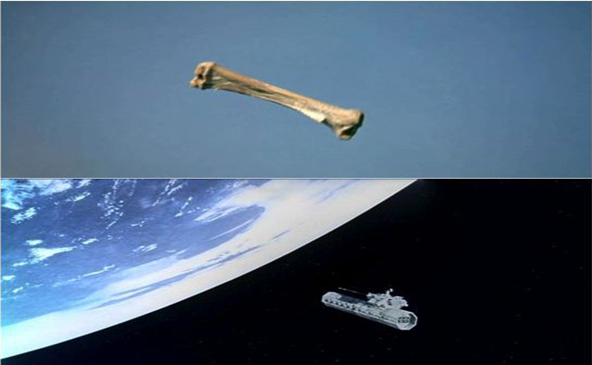2.48 – 2.36 million years ago
A famous movie cut, from 2001: A Space Odyssey, transitions from a bone club, hurled aloft by an australopithecine 2.5 million years ago, to a spacecraft in the year 2001.

Arthur Clarke and Stanley Kubrick, coming up with the plot for the movie/book, were influenced by the popular author Robert Ardrey. In his book African Genesis, Ardrey casts human evolution as a version of the story of Cain and Abel, except in his version the peaceful vegetarians (robust australopithecines) get clobbered by the club-wielding meat-eaters (gracile australopithecines).
We were born of risen apes, not fallen angels, and the apes were armed killers besides. And so what shall we wonder at? Our murders and massacres and missiles, and our irreconcilable regiments? Or our treaties whatever they may be worth; our symphonies however seldom they may be played; our peaceful acres, however frequently they may be converted into battlefields; our dreams however rarely they may be accomplished. The miracle of man is not how far he has sunk but how magnificently he has risen. We are known among the stars by our poems, not our corpses.
Ardrey, along with Konrad Lorenz and Desmond Morris, was much in vogue in the 1960s: Sam Peckinpah was another movie director influenced by him. The man could turn a phrase. Unfortunately his speculations on evolution and human behavior are probably not of enduring value: he had the misfortune to take up the topic too early to take on board the sociobiological revolution pioneered by William Hamilton, Robert Trivers, and George Williams, and popularized by E. O. Wilson and Richard Dawkins.
Ardrey may not have been off-base in thinking that weaponry and warfare have been an important motive force in human biological and social evolution (more on this later). But where early stone tools are concerned, a different segue, from Oldowan chopper to Cuisnart may be more appropriate.


Recent research argues that early hominins could have dramatically increased available food energy by pounding vegetables and chopping up meat into more digestible pieces. Tool use may have been an early step in our ancestors’ move to high energy diets. Meat-eating began to be important in human evolution around 2.6 million years ago. Somewhat later we see evidence that some hominins have lighter jaws and aren’t chewing as much. So to celebrate this early dietary revolution, here’s a recipe:
Steak Tartare
Place in a food processor fitted with the metal chopping blade:
1 ½ pounds lean beef (tenderloin, top round, or sirloin) cut into ½ inch cubes
Pulse until meat is coarsely ground, 7-10 seconds. Do not over-process. Remove meat to a chilled platter or individual plates and gently form into 6 individual mounds.
[Optional: Make a spoon shaped indentation on top of each mound and crack into each
1 egg yolk.]
Divide and arrange in small piles around each serving:
½ cup minced onions
½ cup minced shallots
½ cup minced fresh parsley
¼ cup minced drained capers
8-12 anchovies (optional)
Serve immediately and pass separately:
Fresh lemon juice
Worcestershire sauce
Dijon mustard
Hot pepper sauce
Freshly ground black pepper
Salt
